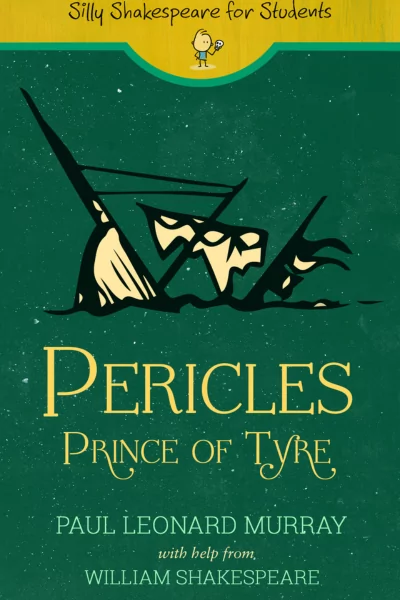Visit BELT – Belgrade English Language Theatre, a drama school bringing stories to life!
PERICLES - Prince of Tyre
A Taste of What's to Come
PERICLES
PROLOGUE
GOWER
You know the plays that Will did write
Macbeth, King Lear, Midsummer’s Night
Othello, Hamlet, Much Ado
Well, these are but his favoured few.
Plenty more are seldom seen,
Like Henry the VIII and Cymbeline.
But bottom of the all-time list
Of Shakespeare’s not-so-greatest hits
The play which always fails to please,
The poor unfortunate Pericles!
Dr. Paul Leonard Murray’s Silly Shakespeare for Students edition of Pericles turns one of Shakespeare’s strangest plays into an over-the-top, laugh-out-loud adaptation. Simplified but never dull, this version leans into the absurdity with a playful commedia dell’arte style that pokes fun at the original. Perfect for students and Shakespeare fans alike, it combines the wild plot with accessible language and clever humor.
Follow Pericles, Prince of Tyre, as he sails the Mediterranean encountering incestuous kings, bawdy fisherwomen, pirates, and a series of misfortunes that somehow lead to a happy ending. With a wife who almost dies at sea, a daughter who almost becomes a victim of murderous parents, and a rescue from pirates that leads to a surprising twist, this is Shakespeare at his most bizarre—and funniest.
Complete with production notes and a play summary, this edition makes staging Shakespeare simple and fun, even for beginners. Whether you’re running a drama club, student theater, or looking to bring energy to your English class, this fresh take on Pericles is guaranteed to entertain!
“Paul’s Pericles is not a salvaged, sterile artefact to be admired behind glass, but a bouncy being, brimming with life, wit and energy….My own daughters loved taking part in performing Pericles under Paul’s direction for the Belgrade Youth Theatre and were thus introduced to the Bard not as a handle-with-care package ensconced in multiple layers of protective bubble wrap but as a flamboyant jack-in-the-box, “to glad your ear, and please your eyes“.
Andreas Roth
- Teacher, Belgrade
“Taking an old classic and simplifying it for better understanding. Shakespeare can be hard to understand but this book tells the same story but in a way that is easier to understand. Great for students and teachers.”
Rhonda G.
- Goodreads reader
“…just as exciting as the original…The exuberance that he displays in making this modern-day adaptation come to life under his guidance is admirable.”
Reader’s Favorite
„The rollicking humor of William Shakespeare’s somewhat bawdy play is retained despite the simplification of the text, and the innate rhythm of the English language still dominates the script. “
Lois Henderson
Dr. Paul Leonard Murray’s Silly Shakespeare for Students edition of Pericles turns one of Shakespeare’s strangest plays into an over-the-top, laugh-out-loud adaptation. Simplified but never dull, this version leans into the absurdity with a playful commedia dell’arte style that pokes fun at the original. Perfect for students and Shakespeare fans alike, it combines the wild plot with accessible language and clever humor.
Follow Pericles, Prince of Tyre, as he sails the Mediterranean encountering incestuous kings, bawdy fisherwomen, pirates, and a series of misfortunes that somehow lead to a happy ending. With a wife who almost dies at sea, a daughter who almost becomes a victim of murderous parents, and a rescue from pirates that leads to a surprising twist, this is Shakespeare at his most bizarre—and funniest.
Complete with production notes and a play summary, this edition makes staging Shakespeare simple and fun, even for beginners. Whether you’re running a drama club, student theater, or looking to bring energy to your English class, this fresh take on Pericles is guaranteed to entertain!
“Paul’s Pericles is not a salvaged, sterile artefact to be admired behind glass, but a bouncy being, brimming with life, wit and energy….My own daughters loved taking part in performing Pericles under Paul’s direction for the Belgrade Youth Theatre and were thus introduced to the Bard not as a handle-with-care package ensconced in multiple layers of protective bubble wrap but as a flamboyant jack-in-the-box, “to glad your ear, and please your eyes“.
Andreas Roth
- Teacher, Belgrade
“Taking an old classic and simplifying it for better understanding. Shakespeare can be hard to understand but this book tells the same story but in a way that is easier to understand. Great for students and teachers.”
Rhonda G.
- Goodreads reader
“…just as exciting as the original…The exuberance that he displays in making this modern-day adaptation come to life under his guidance is admirable.”
Reader’s Favorite
„The rollicking humor of William Shakespeare’s somewhat bawdy play is retained despite the simplification of the text, and the innate rhythm of the English language still dominates the script. “
Lois Henderson
Trivia
Popular in Its Time: Despite being lesser-known today, Pericles was extremely popular during Shakespeare’s lifetime. Records show that it was frequently performed, particularly by touring companies.
A Collaboration?: Scholars believe that Shakespeare only wrote parts of Pericles, with the first two acts possibly penned by another playwright, likely George Wilkins. Shakespeare is thought to have written the latter half of the play, which is more in line with his style.
Performed for King James I: The play was performed for King James I in 1619, showcasing its appeal to the royal court despite its relative obscurity compared to Shakespeare’s other works.
Trivia
Popular in Its Time: Despite being lesser-known today, Pericles was extremely popular during Shakespeare’s lifetime. Records show that it was frequently performed, particularly by touring companies.
A Collaboration?: Scholars believe that Shakespeare only wrote parts of Pericles, with the first two acts possibly penned by another playwright, likely George Wilkins. Shakespeare is thought to have written the latter half of the play, which is more in line with his style.
Performed for King James I: The play was performed for King James I in 1619, showcasing its appeal to the royal court despite its relative obscurity compared to Shakespeare’s other works.

